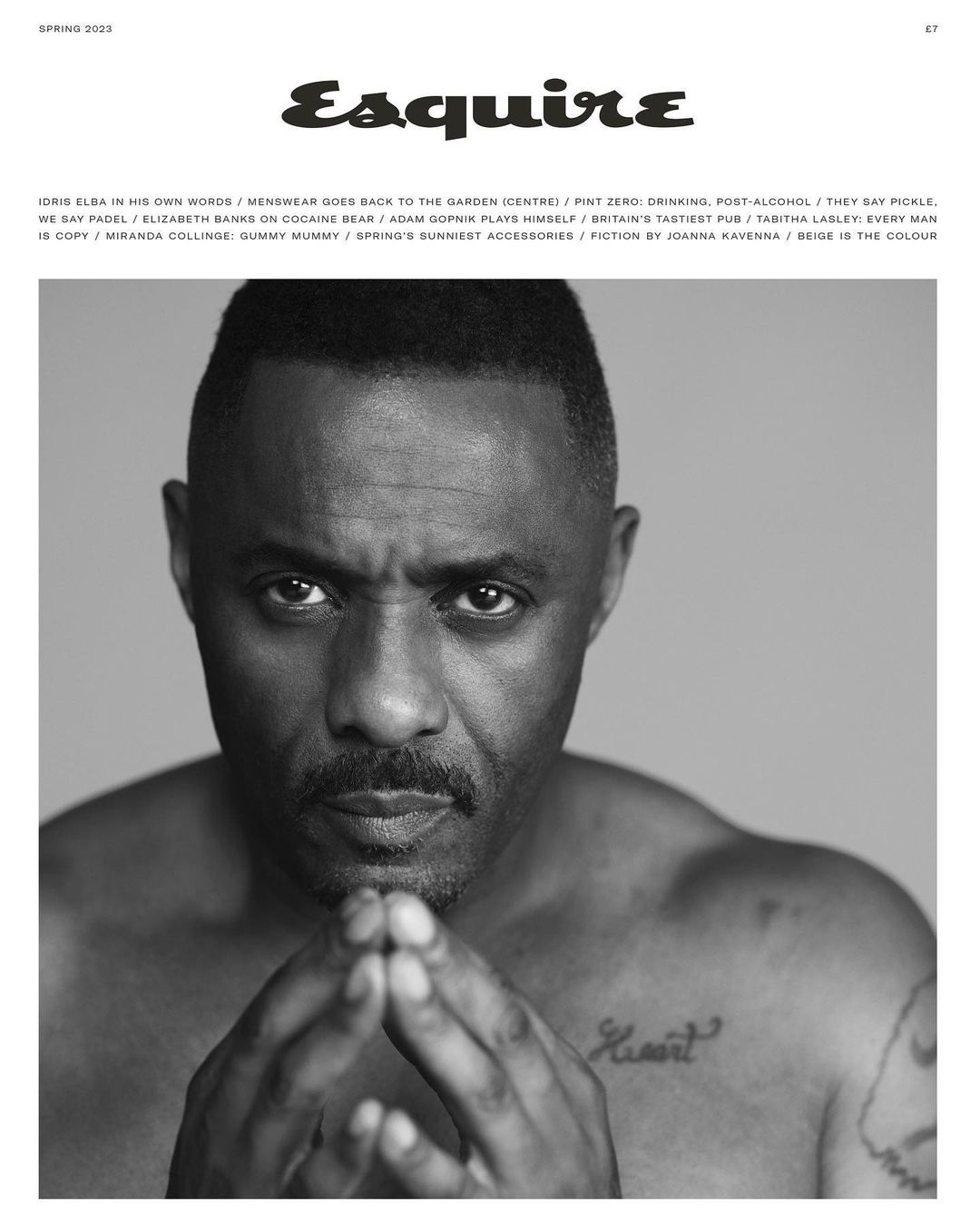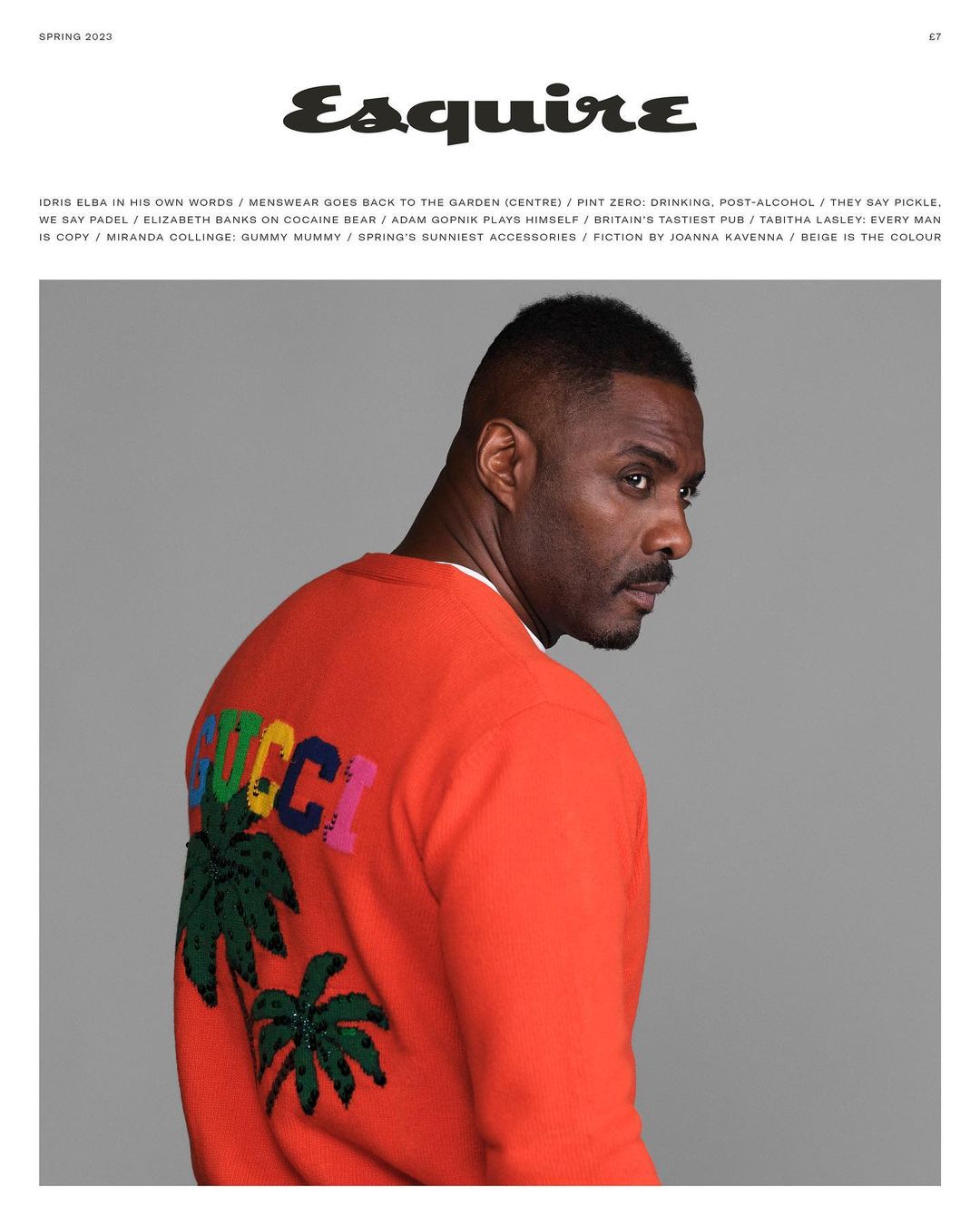When this first came out, I saw the big headline from Idris Elba’s Esquire interview and I was like “ugh, do I even want to cover this?” It took me a while to sit down and read the whole thing and remember why I like Idris so much. Everything he says in this piece has a particular context- he’s the only child of African immigrants, he’s experienced profound racism in the UK, he found better work in America, but he still returned to the UK to raise his kids. That’s the context for Idris saying that he doesn’t consider himself to be a “Black actor.” I get it, but I also get why people want to talk about it and argue about it. Some highlights from Esquire UK (he’s promoting Luther: The Fallen Sun, just FYI).
Turning 50: “Every day is my birthday. I didn’t make a big deal out of it. Physically I feel fine. Things move slower. You definitely feel those aches and bumps. But then, I always have. I live an extreme lifestyle, I guess.”
The only child: “I’m the same person I always was. Only child. And I’m still an only child, even though I’ve got a lot more people around me. Introspection has always been a part of me, since I was conscious. That introspection is still very alive now. And I feel very connected to that young guy, who was very ambitious in his thoughts. Curious, always curious.
African culture, British culture: “Although I was born in England, the first culture I experienced was Sierra Leonean. The food, the environment, the music, the clothes, the attitude to the weather. All my experiences were West African first, then UK culture. I love being English, I love the culture here, I grew up here, I became a man in England, I’m very attached to it. But at the same time, I’ve also got another culture, which is African, Sierra Leonean specifically. I’m really thankful for it.
Race and racism: “I’m always curious why this is fascinating to people. It’s a question I get asked a lot. I don’t go to my Black friends, in conversation, and ask them to tell me about racism. Have I ever faced racism? Yeah. I’m not any more Black because I’m in a white area, or more Black because I’m in a Black area. I’m Black. And that skin stays with me no matter where I go, every day, through Black areas with white people in it, or white areas with Black people in it. I’m the same Black.
He no longer calls himself a Black actor: If we spent half the time not talking about the differences but the similarities between us, the entire planet would have a shift in the way we deal with each other. As humans, we are obsessed with race. And that obsession can really hinder people’s aspirations, hinder people’s growth. Racism should be a topic for discussion, sure. Racism is very real. But from my perspective, it’s only as powerful as you allow it to be. I stopped describing myself as a Black actor when I realised it put me in a box. We’ve got to grow. We’ve got to. Our skin is no more than that: it’s just skin. Rant over.
He’s still a member of the Black community: “Of course, I’m a member of the Black community. You say a prominent one. But when I go to America, I’m a prominent member of the British community. “Oh, UK’s in the house!”
Living & working in America for years: “New York was a pilgrimage. America was this shiny dream-state. Look at the scale of it! Look at the music, look at the culture! Look at the TV, film, magazines! I was 17, 18. You just felt the opportunities. You could start off with a dollar, in New York, and rise. That was real. That’s why I went. Is that the same America we’re looking at today? Perhaps not. Things have changed. But I’m looking at it through 50-year-old eyes now.
He loves working in America: “America gave me technical understanding of my craft. It was an enhancement. I learnt a lot. American actors have always been great. The works of Shakespeare live in a world of wonderment, poetry, fairytale, the language of beauty and eloquence. The performer uses a skillset that amplifies that. There is an air and a grace to it that a good English actor has to understand. In America, in an Arthur Miller play, you might get a guy who’s just a guy. Guy from Pennsylvania, guy from New York. Just a guy. A human. American actors had this connection with real life. The accent and the cadence of the words in America allows for a really interesting flow of thoughts.
What I found interesting was how much he talked about living a particular kind of American dream and how much he loves America… while speaking to a British publication. British actors often get punished in the British press for being too pro-America, even if those actors are getting much better opportunities in America. Still, I guess Idris gets points for moving back to the UK. As for what he says about “I stopped describing myself as a Black actor when I realised it put me in a box. We’ve got to grow” – I get it. He’s not denying his race or what have you, he’s saying that his language changed in how he describes himself and thinks of his career. It’s the whole idea behind “colorblind casting,” I guess – it’s not that Idris will stop playing Black characters, it’s that he doesn’t want to ONLY get scripts which are exclusively written for Black actors.
Covers courtesy of Esquire.















A lovely start to a Friday – IDRIS!!
I don’t describe myself as a “woman lawyer” so I think I understand what he’s trying to say
I get called a “lady doctor” all the time, so I get it too.
If y’all are not Black I doubt you understand. Comparing Blackness to womanhood isn’t a wise thing to do, especially considering there are people like me who check both boxes. It’s not the same
Exactly. And I really wish white women would stop doing this.
There is a great chasm between how Black Brits relate to being Black vs to how Black Americans relate to being Black. And all one has to do is listen to a Black Brit talk about race. And it’s one of the reasons why so many Black folks don’t like having Black Brits play Black American icons like MLK and Harriett Tubman. Because there is a fundamental gap in the knowledge and understanding of the experience. His comments are very “kumbaya”. Which is what make White Brits comfortable.
I’ve noticed this too! You articulate this so well; I’ve never been able to put my finger on exactly what the difference is, but I noticed it for sure.
It seems to me that Black Brits are generally just less…educated about race because all Brits are generally less educated because Britain is (like many European countries and former British colonies) largely in denial about its racist past/racism. It hasn’t really confronted either and while the United States still has a LOT of work to do, Americans have had to be more honest about their own history because it was absolutely undeniable.
Black Americans have mobilized politically to great success and are much more cognizant of Black history, savvy about politics, etc. In my opinion, Americans just aren’t as naive about racism in general whereas Brits like to maintain a facade while racism is very much alive and well beneath the surface.
You really did put that well. That’s how I’ve always been, what he’s describing. Growing up. But now, reading the same things I’d say to someone else taints his words, because I’ve moved on from that kind of “everybody” talk. So I hear you. Thank you for saying it. I love Idris, truly, but for the first time, reading about him, I cocked my head. LOL
There is a fundamental difference about how Black Brits and African-American talk about race that makes absolute sense. Their experience of how that arrival in US and the UK is very different. Britain, considering how heavily involved it was in slavery had relatively few slaves in their home territory. It kept its slavery activity away from its kingdom and did its atrocities off shore so that the population could stay relatively ignorant. It’s school curriculum on empire, colonialism and imperialism would satisfy Florida and Texas. Also those text books were used in its former colonies longer than they should have been. Most of the folks of African descent who are in the UK family made a conscious decision to immigrate, even if they were running from the chaos of colonial rule. Many know their geographic heritage, and many Caribbeans, use the island they are from as their starting point. Therefore their experience of racism in Britain is different than the African American experience. Also Britain’s codify class system intersects with racism that obscures it. Working class white speak in ways that seem to accept the class system and lack of mobility, which means that they don’t expect improvement for anyone, even themselves.
The African-American experience is a entirely different thing. Even people of African descent who immigrate to the US “become” fully African American in a generation or two and they way they are treated and see themselves is rarely different from African American whose families have been here since 1619.
I do think it is problematic when any group assumes that their experience with anti-Black racism is the authentic one, and groups with different experiences are falling down on the fight because their response if different. I think the experiences are different, the fight may be different, therefore the tactics required might be different.
I think it’s so interesting how the British class system obscures its racism…I noticed that, too. Especially in cases where I’ve heard these Black British academics waxing on about how there’s no racism and thinking, what on earth? I realized that they’re in a class bubble of sorts and they’ve just absorbed this “colourblind” intellectual narrative that’s completely oblivious and wasn’t ever intended for them. The lack of awareness just seems so much more prevalent over there, even though I understand that they have a fundamentally different experience.
One of the first times I picked up on the cluelessness about race was reading an interview with Ruth Negga saying she’d grown up in Ireland and had never experienced racism. Like really? Are you serious? I would bet good money that she just didn’t recognize it when she experienced it.
Grniewnie, not just that she didn’t recognise it, she might have not encountered it face to face. Unlike Americans, Brits always used a cover of ‘politeness’ and fake courtesy when dealing with foreigners.
Speaking as a non-uk born British national, until Brexit I had never experienced xenophobia but that doesn’t mean I had never encountered it, it only meant that after 2016 people felt they could be hostile against EU citizens face to face.
I get it too but man, he doesn’t want to come across like OJ: “I’m not black, I’m OJ!” That won’t find you love in America.
“I’m Black. And that skin stays with me no matter where I go, every day, through Black areas with white people in it, or white areas with Black people in it. I’m the same Black.”
Sure, his skin doesn’t change colour. But how Black is perceived and treated absolutely changes depending on social context. Black in Africa is not the same as Black in America, at all. He’s referring to black like it’s just his skin colour, but it’s also a social construct. OJ had a chance to address race-the-social-construct and instead, he made his public image all about OJ, the individual – it didn’t endear him to Black Americans.
With that said, of course I sympathize with him for wanting to rid himself of the way his race is positioned as central to his identity or the identity people assign to him. That’s the burden of basically not being a white male. Of course it sucks but pretending race is inconsequential feeds into the whole stupid “colourblind” ethos of American conservatism.
If he wants to be considered for all kinds of characters not just black ones then he should have said that. Instead he says this nonsense about not being a black actor. The fact that he had to go to the US to have a career means he is seen as a black actor despite his feelings. He only got Luther after he made it in the US. He should talk about that instead of declaring himself to be not a black actor.
WORD UP.
He can say he doesn’t want to be called a black actor all he wants, but the fact of the matter is everyone knows Idris Elba is indeed a black actor. Does he think casting doesn’t know this?
Does he think that once he shows up and if they don’t want a black actor they will give him the part. It’s 2023 and this country is headed in the opposite direction back to the 1950’s.
It s nice dream but the reality of black people in America regardless if you or your ancestors were brought here against their will or freely came here on their own is the same. It’s a not color blind world.
Look, I’m sure black actors get tired of being described as black actors. I wouldn’t describe myself as a “woman
Professor.” But I also think if saying you’re black puts you in a box, maybe you should work to dismantle the box before jumping out of it.
Winner winner chicken dinner.
“Jumping out of the box” is why those actors come to the US in the first place. In the US, they can be seen as British first, especially when they open their mouths. They don’t have to break the box in the US. They won’t be put in that box. If you look at Idris’s career post The Wire, compared to the Black American cast members outside of Michael B Jordan, none of them have gotten the lead roles like Idris. And he knows this.
I really thought about this watching I May Destroy You. The Black experience in Britain is often an immigrant story, so different from the US. The identity politics are very different. He has a national origin and a racial identity, just as many first and second generation Americans do, something most Black Americans have been denied because their ancestors have been in the US for centuries with their histories stolen. But the daily life experience of being Black in Britain or the US sound very similar. I’m not sure what I’m saying, other than itself complicated and I can only listen and try to understand.
Yep, the experience is different.
The way of dealing with racism is different.
Also, Black Brits’ security of place is different. Despite. white supremacists going on about “sending them back to Africa”, for African Americans with pre-emancipation roots there is no Africa to send them to. “Africa” is not a country and there is no specific place where they have acknowledge ties. Not even 23 and Me can help with that.
Folks of African descent in the UK don’t have tap roots that go as historically deep in the UK soil. The racist repatriation of the Windrush generation is proof that the UK can connive to uproot people who rebuilt that nation and toss them away like out dated equipment. The Rwanda repatriation flights are another (but different) example of their nation’s moral bankruptcy when dealing with non-white people.
Well, I’m very fond of Idris, and the old Luther series were how I got to know him, but did you watch the new movie? I did, but I had to skip over a lot. I found it to be quite horrible. Torture and horror. To me, it was more torture porn than a detective story. You know, they still redo Agatha Christie mysteries, they are still a lot of fun, and they don’t include those elements. I watched the movie, but I had to skip a lot. Be prepared.
I am wondering if he is addressing a white audience (casting directors/ directors/producers in particular, white in general) with these statements?
Given that white people usually don’t have to think about these things/nuances all of/ any of the time (even though we obvs should), it sounds to me like he is breaking it down in digestible/palatable bites and leaves out the nuances as most of that audience wouldn’t necessarily get it, or they wouldn’t resonate with them.
Interesting to read the comments re the differences in the US/UK black British experience. So much to think about and consider!
He’s not. The white American casting directors/directors/producers know he’s not Black American, so they can see him as something OTHER than a stereotype.
Africans don’t have the same rapport to blackness to Afro Americans. Their first sense of identity is their tribe their country their culture not being black. From that view point black brits will not always have the same views as black Americans on race/racism.
I get what he’s trying to say and at the same time I get why people are angry with him.
My criticisms would be it’s always on us to adapt to racism, find a way to deal with it and we should get out of that mentality his comments are not helpful on achieving that.
I’ll just say that I’ve been in love with this man for years. I am happy to see him. Thank you, Idris, and thank you Celebitchy for giving me a bit of joy during a bleak time in my life.
Since every “body” that enters a room tells a story, even if the story we hear isn’t the correct story, the industry is moving away from “color blind” casting and towards “color conscious” casting. The desire is to offer more opportunities to non-white actors while making sure the casting enhances the story and not disrupt it.
I understand why Mr. Elba is working to move away from the “Black actor” box, but for that to work, the people who offer roles and greenlight casting have to agree with destroying the box.
This really hurts my ladywood for him. At best he was inarticulate. At worst he was in an ‘I’m not Black I’m Oj’ state of mind. Either way. wood killer. I’m just going to chalk it up to what Giannis said when he was missing 3 point shots – God couldn’t give me everything. I can’t be handsome, and have a beautiful wife and great kids and dunk and get rebounds AND hit 3’s. Idris can’t be hotter than fish grease and be an amazing actor AND be a scholar.
I was in my feelings when I read about this. However, when I read his actual words it felt more like an error in phrasing than when OJ pulled his “I’m OJ” stunt. I took it as “I’m an ACTOR who is also Black” and not just a “Black actor”. But it’s splitting hairs I know. I had a spirited and similar argument with one of my coworkers who is not a POC (I am and also female) when discussing BLM. He said that he “could see where people could get touchy that it was excluding other at risk minority groups” making a case for “all lives” and all that. A big part of me (aside from the heavy hand slap to the forehead for these kinds of conversations) feels that even BLM would have been stronger if their name was “Black Lives Matter Too” as in, we are not treated like we matter, so check yourself and consider that our lives (like many other minority groups and white lives) matter ALSO. Sometimes a comma stands between dinner and cannibalism for anyone who knows that famous “Let’s eat grandpa/Let’s eat, grandpa” example.
Big heavy topics yes. Just IMO, long story short, is I think Idris had pooorrrrr phrasing and wasn’t trying to deny his Blackness, but in sum effect, it def sucks that his message doesn’t help move our cause forward any at all.
“ But from my perspective, [racism is] only as powerful as you allow it to be.”
—Uh, NO.
Yeah, I was trying very hard to come at this with a positive, supportive spirit— until I got to that line. His “perspective “ works for him, I guess. Must be nice. I guess being rich and famous and apparently welcomed to take a seat at some of the more powerful tables has blinded him to the experiences and histories that continue to heavily impact the rest of us.
Isn’t that ‘his truth’ though? And he is allowed to express his truth. There is no point inventing falsehoods just to try and please some readers. Judging from the excerpts of the article posted here, it seems to be a thoughtful interview. It is not antagonistic to anyone who may have different views. Sometimes it can be useful to consider a different point of view, even if it is on an issue that you feel passionately about.
Nobody says they’re a white actor, so I guess he doesn’t have to.